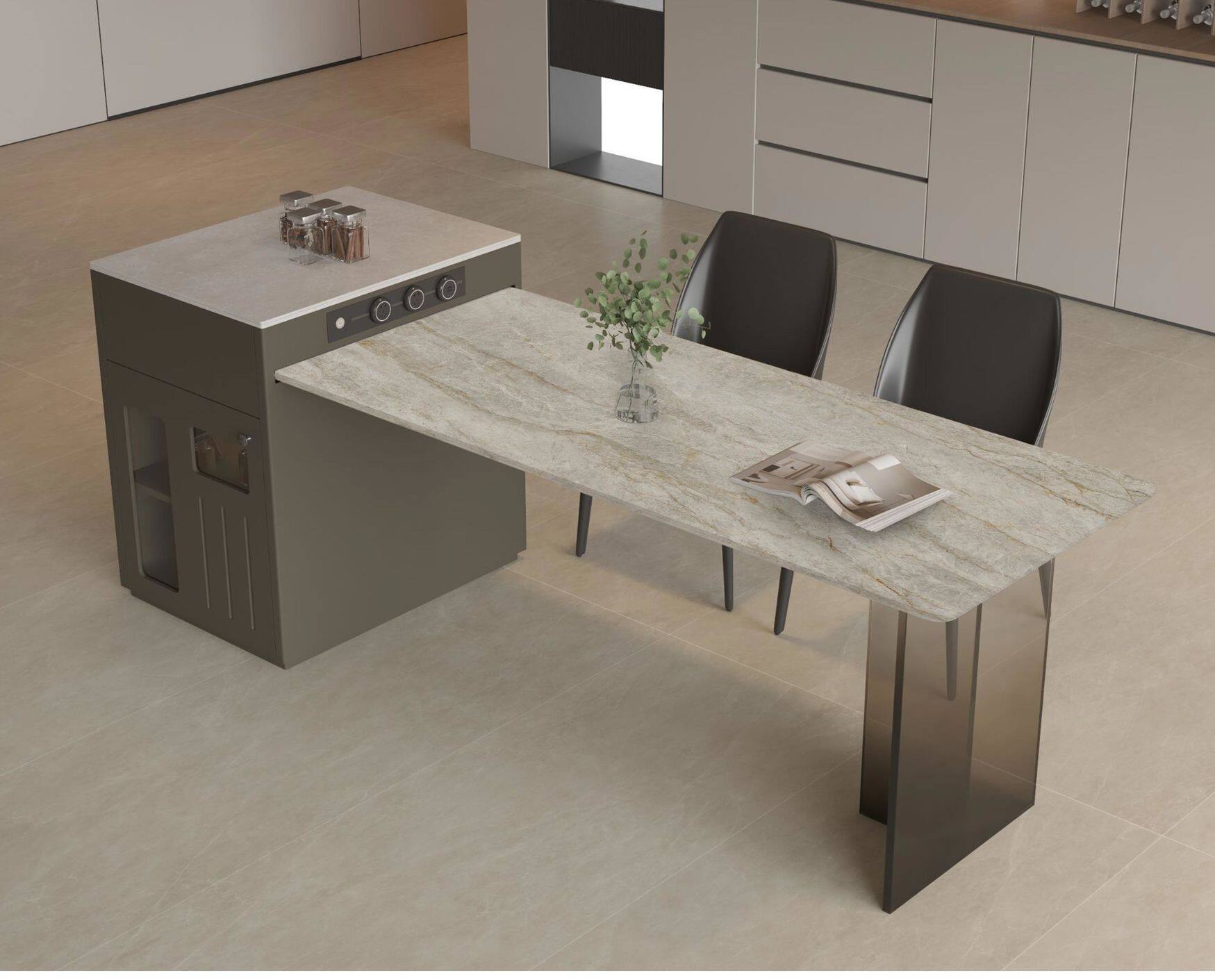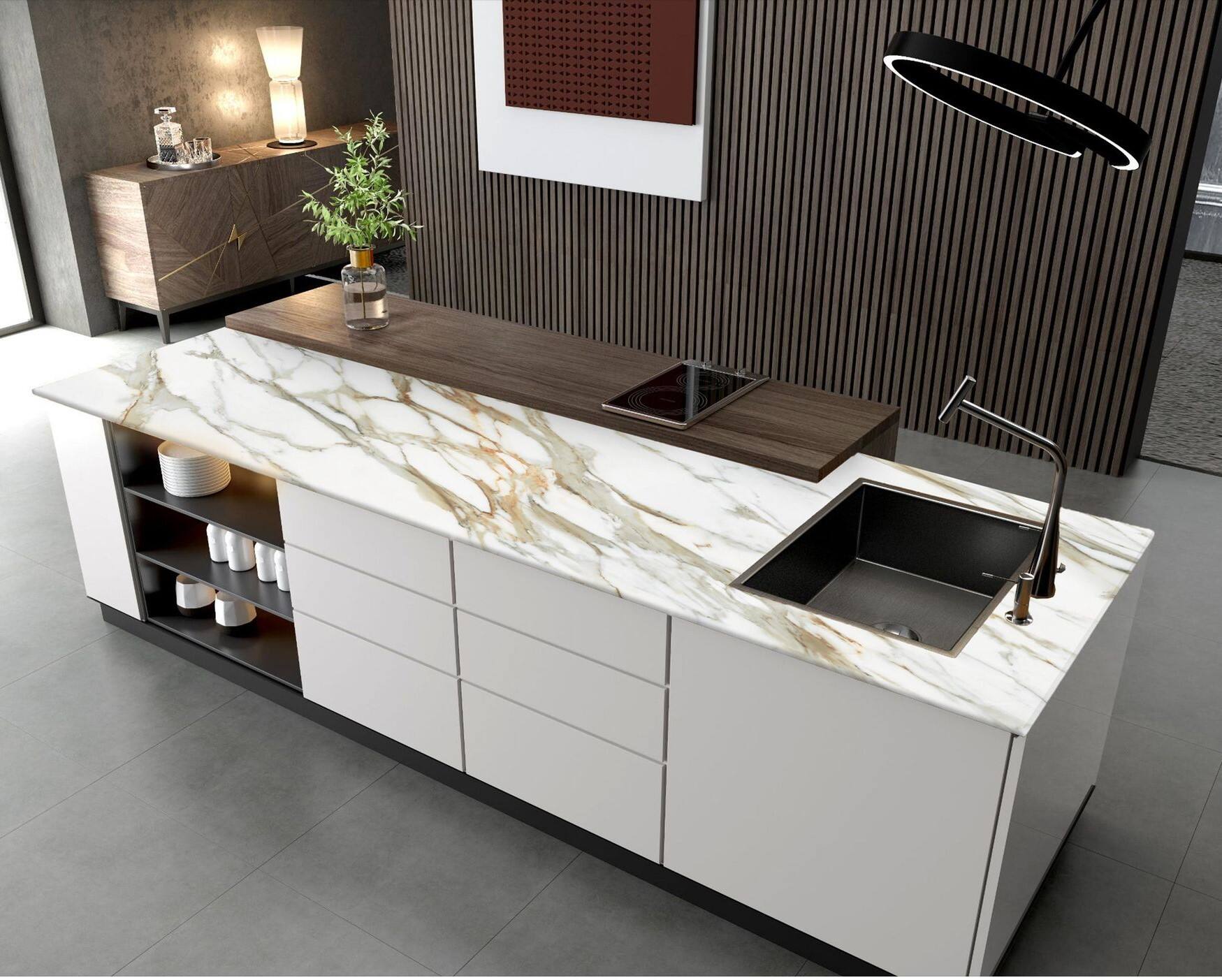Tuklasin ang Mga Benepisyo ng Sintered Stone Tiles para sa Iyong Proyekto
Mga tile na sintered stone ay isang modernong, mataas na performans na materyales na kumukuha ng katanyagan sa konstruksyon at disenyo. Ginawa sa pamamagitan ng pagpindot sa mga natural na mineral (tulad ng quartz, feldspar, at luwad) sa ilalim ng matinding init at presyon, nag-aalok sila ng natatanging mga benepisyo kumpara sa tradisyonal na mga materyales tulad ng marmol, graba, o ceramic. Kung ikaw man ay nagtatrabaho sa isang kusina, banyo, o labas na patio, mga tile na sintered stone dala ang tibay, istilo, at kakayahang umangkop. Alamin natin ang kanilang mga pangunahing benepisyo at bakit sila isang matalinong pagpipilian para sa iyong proyekto.
1. Ispesyal na Katatagan
Ang mga tile na sintered stone ay ginawa upang tumagal, na nagpapagawa itong perpekto para sa mga mataong lugar o espasyo na nalantad sa matinding kondisyon.
- Paglaban sa mga silya at pagbasag : Hindi tulad ng natural na bato (na madaling mabasag) o ceramic (nakatutok sa mga bitak), ang sintered stone tiles ay sobrang tigas. Kayang-kaya nilang tumanggap ng mabibigat na muwebles, nahulog na plato, o kuko ng alagang hayop nang hindi nasasaktan. Ginagawa nitong perpekto para sa countertop ng kusina, sahig na tile, o komersyal na espasyo tulad ng restawran.
- Resistensya sa Init : Kayang-kaya ng sintered stone tiles ang mataas na temperatura nang hindi nasusunog o nababago ang kulay. Maaari mong ilagay ang mainit na kaldero nang direkta sa sintered stone countertop ng kusina o gamitin ang mga ito sa paligid ng fireplace—hindi na kailangan ng trivets.
- Tigas sa panahon para sa labas : Kayang-kaya ng mga tile na ito ang ulan, yelo, UV rays, at sobrang temperatura. Hindi ito mawawalan ng kulay sa ilalim ng araw, mababasag sa malamig na panahon, o hihigop ng tubig (nagpipigil ng mold). Ginagawa nitong maganda para sa outdoor na terrace, sahig sa paligid ng pool, o panlabas na pader.
Para sa mga proyekto kung saan mahalaga ang haba ng buhay, ang sintered stone tiles ay higit na maganda kaysa maraming ibang materyales.
2. Pagtutol sa Mantsa at Kemikal
Ang mga tile na sintered stone ay hindi nakakalusot ng tubig, ibig sabihin ay hindi makakapasok ang mga likido at kemikal sa kanilang surface—nagpapanatili sa kanila na mukhang bago sa loob ng maraming taon.
- Walang mantsa : Ang mga pagbubuhos tulad ng kape, alak, langis, o sarsa ay madaling natatanggal gamit ang basang tela. Hindi tulad ng natural na bato (na nangangailangan ng regular na pag-seal upang umangkop sa mantsa), ang mga tile na sintered stone ay hindi nangangailangan ng pag-seal. Ito ay nakatipid ng oras at pera sa pagpapanatili.
- Ligtas sa matitinding panglinis : Maaari mong gamitin ang malakas na mga produktong panglinis (tulad ng bleach o disinfectants) sa sintered stone tiles nang hindi nasisira ang mga ito. Ito ay kapaki-pakinabang sa mga banyo, kusina, o mga pasilidad sa pangangalagang pangkalusugan kung saan mahalaga ang kalinisan.
- Lumalaban sa amag at milidyew : Ang kanilang surface na hindi nakakalusot ng tubig ay hindi nakakapigil ng kahalumigmigan, kaya hindi makakatubo ang amag at mantsa. Ginagawa nitong perpekto para sa mga basang lugar tulad ng shower, sauna, o mga laundry room.
Para sa mga maruruming o mataas na kahalumigmigan na kapaligiran, ang sintered stone tiles ay nananatiling malinis at hygienic na may kaunting pagsisikap.
3. Mga Versatil na Opsyong Disenyo
Ang mga tile na sintered stone ay may malawak na hanay ng mga istilo, kulay, at texture, na nagpapadali sa pagtugma sa anumang aesthetic ng proyekto.
- Mukhang natural na bato (nang walang mga depekto) ang mga tile na sintered stone ay kumukunwari sa kagandahan ng marmol, granto, o travertine—kasama ang mga ugat, pattern ng grano, o matagong surface. Pero hindi tulad ng natural na bato, walang bitak, butas, o hindi pantay na kulay, na nagsisiguro ng magkakasingtunog na itsura sa iyong proyekto.
- Mga moderno at matapang na opsyon higit pa sa itsura ng natural na bato, ang mga tile na sintered stone ay may solidong kulay (puti, itim, abo), metallic na surface, o kahit mga texture na parang kongkreto. Ang mga ito ay gumagana nang maayos sa mga modernong bahay, minimalistang opisina, o industrial-style na espasyo.
- Mga available na malalaking sukat ang mga tile na sintered stone ay maaaring gawing malalaki (hanggang 160cm x 320cm). Binabawasan nito ang bilang ng mga linya ng grout, na lumilikha ng maayos, walang putol na itsura para sa sahig, pader, o countertop.
Anuman ang iyong design vision—traditional, contemporary, o eclectic—may sintered stone tile na akma.

4. madaling pag-install at pagpapanatili
Ang mga tile na sintered stone ay praktikal pareho para sa mga naglalagay at mga may-ari ng bahay, na may simpleng pangangalaga at maaaring i-install sa iba't ibang paraan.
- Mabilis sa Timbang para sa Madaling Paggamit : Bagama't matibay, ang mga tile na sintered stone ay mas magaan kaysa sa mga natural na bato. Ito ang dahilan kung bakit mas madali silang ilipat at ilagay, na nagpapababa ng gastos sa paggawa. Maaari silang putulin sa tamang sukat gamit ang karaniwang kagamitan, upang akma sa mga sulok, outlet, o fixtures.
- Mababang Pangangalaga : Hindi tulad ng natural na bato (na nangangailangan ng pangangalaga bawat 6–12 buwan) o kahoy (na nangangailangan ng pagpo-polish), ang mga tile na sintered stone ay halos hindi nangangailangan ng pangangalaga. Sapat na ang mabilis na paglinis gamit ang sabon at tubig upang manatiling malinis ang mga ito. Ito ay nakatipid ng oras at pera sa kabuuan ng gamit ng tile.
- Maaaring gamitan ng grout : Kapag ginamit bilang tile sa sahig o pader, ang sintered stone ay maaaring gamitan ng anumang kulay ng grout. Maaari kang pumili ng grout na kapareho ng kulay ng tile para sa isang seamless na itsura o magkaibang kulay upang mapansin ang mga gilid ng tile—nagdadagdag ito ng kalayaan sa disenyo.
Para sa mga proyekto sa bahay o sa mga propesyonal na paglalagay, ang mga tile na sintered stone ay nagpapasimple ng proseso mula umpisa hanggang katapusan.
5. Maka-ekolohiya na Pagpili
Ang mga tile na sintered stone ay gawa sa mga pagsasagawa na nakabatay sa kalinisan, na tugma sa mga uso sa pagbuo ng eco-friendly na gusali.
- Recycled Materials : Maraming tagagawa ang gumagamit ng mga na-recycle na mineral o tubig sa produksyon, upang mabawasan ang basura. Ang ilang sintered stone tiles ay mayroon pa ring hanggang 40% recycled na nilalaman.
- Mahaba na Buhay : Dahil sa kanilang katatagan, bihira silang kailanganin ng kapalit, anupat binabawasan ang basura sa materyal. Hindi tulad ng mga tile ng ceramic (na maaaring mag-crack at kailangang palitan bawat 1015 taon), ang sintered stone tile ay maaaring tumagal ng 30+ taon.
- Walang masasamang kemikal : Ang sintered stone tiles ay walang mga nakakalason na sangkap tulad ng formaldehyde o volatile organic compounds (VOCs). Hindi ito naglalabas ng mga nakakapinsalang usok, kaya ligtas ito para sa mga tahanan, paaralan, o pasilidad sa pangangalagang pangkalusugan.
Ang pagpili ng sintered stone tiles ay nagbibigay-daan upang makalikha ka ng magandang espasyo habang minimitahan ang epekto nito sa kalikasan.
FAQ
Paano naiiba ang sintered stone sa natural stone?
Ang likas na bato (tulad ng marmol) ay minumina mula sa lupa at may likas na depekto (bitak, mga butas). Ang sintered stone ay gawa sa tao mula sa mga mineral, na may pare-parehong, hindi nakakapori na ibabaw—mas matibay at madaling pangalagaan.
Mahal ba ang sintered stone tiles?
Mas mahal ito kaysa sa ceramic o laminate pero kadalasan mas mura kaysa sa mahal na likas na bato (tulad ng marmol). Dahil sa kanilang mahabang buhay at mababang pangangalaga, ito ay matipid sa gastos sa paglipas ng panahon.
Maari bang gamitin ang sintered stone tiles nang labas?
Oo. Ito ay hindi nababasa ng ulan, nakakatagpo ng UV, at hindi nababasag ng hamog, na nagpapagawa dito na perpekto para sa mga patio, lugar ng pool, o panlabas na pader.
Nag-iiwan ba ng kulay ang sintered stone tiles sa ilalim ng araw?
Hindi. Ito ay nakakatagpo ng UV rays, kaya ang kanilang kulay ay nananatiling pareho kahit ilalapat sa diretsong sikat ng araw—perpekto para sa mga labas na espasyo o silid na may maraming liwanag.
Maari ko bang i-install ang sintered stone tiles sa aking sarili?
Mga maliit na proyekto (tulad ng backsplash) ay kayang-kaya ng mga DIYer na may basic tools. Para sa malalaking lugar (garahe, countertop), ang pagkuha ng propesyonal ay nagpapaseguro ng maayos na pag-install (pag-level, pagputol) at nakakaiwas ng mga pagkakamali.

